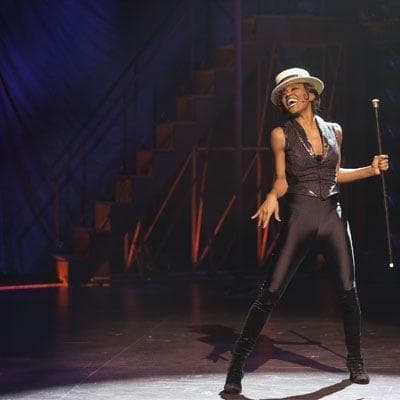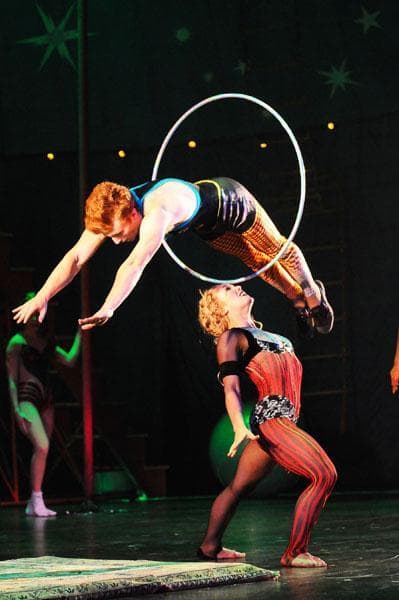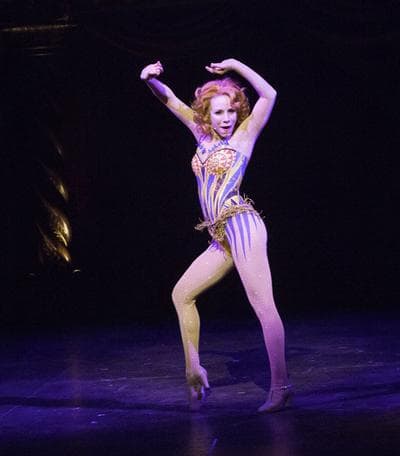Advertisement
REVIEWS
Paulus's 'Pippin' Is A Pip — Till It Plops

I went to a musical and a carnival broke out.
Diane Paulus certainly knows how to breathe life into a musical. “Hair” and “The Gershwins’ Porgy and Bess” both benefitted from the energy she brought to the source material. So does the first act of “Pippin,” which opened at the American Repertory Theater Thursday night after almost a month of previews (and runs through Jan. 20). But I doubt there’s a play doctor or musical medic alive who can save the wayward second act.

I’m getting about 40 years ahead of myself. “Pippin” began life in 1972, a collaboration between Stephen Schwartz, who wrote the music and lyrics; Roger O. Hirson, who wrote the book; and Bob Fosse, the director and choreographer. It tells the story about the son of Charlemagne, a young man in quest of an extraordinary life. The original had a successful run on Broadway before becoming a favorite of school and community theater productions that watered it down.
Paulus pumps it up, with the help of amazing acrobatics choreographed by Gypsy Snider of Les 7 Doigts de la Main, who has the cast jumping through hoops, shimmying up poles, and gyrating their bodies in ways that seem impossible and might even be illegal in certain American counties. The band of storytellers has been replaced by circus troupers, who begin the show with a spectacular show of their own, the circus folk even spelling out “Pippin” before himself jumps through a hoop to begin the story in earnest.
Here's Paulus talking about the production:
The Pippin actor, Matthew James Thomas, is no stranger to circus-style antics, having starred as the late Peter Parker in the original production of “Spider-Man: Turn Off The Dark.” He’ll be getting another chance at the Great White Way, apparently, as that’s where “Pippin” is headed.
That the house Robert Brustein built is even staging “Pippin” is a bit of shock and awe for the Boston community. Personally, I think every artistic director is entitled to his or her sensibility so let’s stick with “Pippin,” which isn’t the frothy musical it’s cracked down to be, anyway.
It was born in the miasma of the ‘60s – which were really 1965 to 1975 – and Pippin dutifully tries out war, sex, and political rebellion in the first act as a way of testing his extraordinariness before moving on to political compromise, ordinary life and – we won’t say what else – in the second.
The women get all the great solos. Andrea Martin puts on a display that can't be described.
Anyway, I’m getting ahead of myself again. It’s not only those acrobatics that make the first act match the extraordinariness of Pippin’s journey. First of all, Pippin is perhaps the least interesting character in Pippin. It’s the women who surround him who get all the great solos, starting with Patina Miller as the Leading Player or emcee, the part for which Ben Vereen seemed to own and for which he won a Tony. Whether you think the gender switch works might depend on your gender preference.
Me, I’m not complaining. Miller is an electric presence in a role reminiscent of Fosse’s “Cabaret,” though if Joel Grey ever moved his hips like Miller somebody would have called 911. The non-circus choreography is done by Chet Walker, a dancer in the original “Pippin” and a co-creator of “Fosse.” His work is in the style of Fosse, though I prefer Walker’s technique. It’s sensual as well as sexual and a lot less glib. Miller’s great gospel-induced solo, “Glory,” captures the folly of Pippin’s glorification of war – with some jaw-dropping stagecraft by Paulus in the background.
Another Fosse veteran, Charlotte d’Amboise, has lost very little in middle age. As Fastrada, Pippin’s stepmother, she gives him the old song and dance in “Spread a Little Sunshine” not only with Walker’s trademark sensuality but with large dollops of her own trademark elegance and humor. The whole cast, in fact, is excellent, including our old friend, Stephanie Pope, from the North Shore Music Theatre.
But they all have to take a back seat to Andrea Martin, a frequent visitor to the Huntington under Nicholas Martin’s stewardship, as Pippin’s grandmother, Berthe. She puts on a display in "No Time at All," about living life to the max that can’t be described. Actually it can, but the producers have asked us not to and they’re correct in doing so.

The revolution comes after that and then intermission. So during the break let me just say that I’m not a big fan of Stephen Schwartz, who wrote the music and lyrics. He worked with Leonard Bernstein on “Mass,” writing some of the lyrics and “Pippin” has moments that recall both “Mass” and “Candide.” (How about taking those on, Diane Paulus? “Candide” has yet to have a really convincing production, even Mary Zimmerman’s at the Huntington.) Schwartz is a good lyricist, but his music is Lenny light, pleasant enough but rarely taking the leap to making the work extraordinary, to use Pippin’s terminology.
Which takes us to Act II. Yes, I’m afraid we have to go there and you’ll stick around too, hoping for a return of that first-act magic. Unfortunately, the point of Act II is that life isn’t a cabaret, old chum, and that the search for the extraordinary is doomed. Even the grand finale is a dud, and planned to be that way.
There is another excellent solo, by Rachel Bay Jones as the love interest, Catherine, but everything else is pretty deadening except for the epiphany by Theo, Catherine’s son, which I also won’t reveal. Even Miller stops moving and shaking, and singing. The meanspiritedness of her character embodies the dour nature of the act.
Not every musical has to leave you singing in the rain, obviously, but “Pippin” simply loses all its steam and the creators muddle their message. Life should be lived to the max. No it shouldn’t. Yes it should. No it shouldn’t. Well, maybe when you’re young.
True, we all have a version of this debate ourselves, but I think we go to the theater to get rid of that noise and to either make sense of the chatter or to be entertained. Act II doesn’t do much of either.
So, “Pippin,” I’m glad to have made your acquaintance after all these years, but I’m not sure I missed all that much. The real star of this show is Paulus and what she brings to it. But as far as that second act goes, Pippin, get a life.
Ben Vereen's version of "Glory" from the original production:
This program aired on January 5, 2013. The audio for this program is not available.


